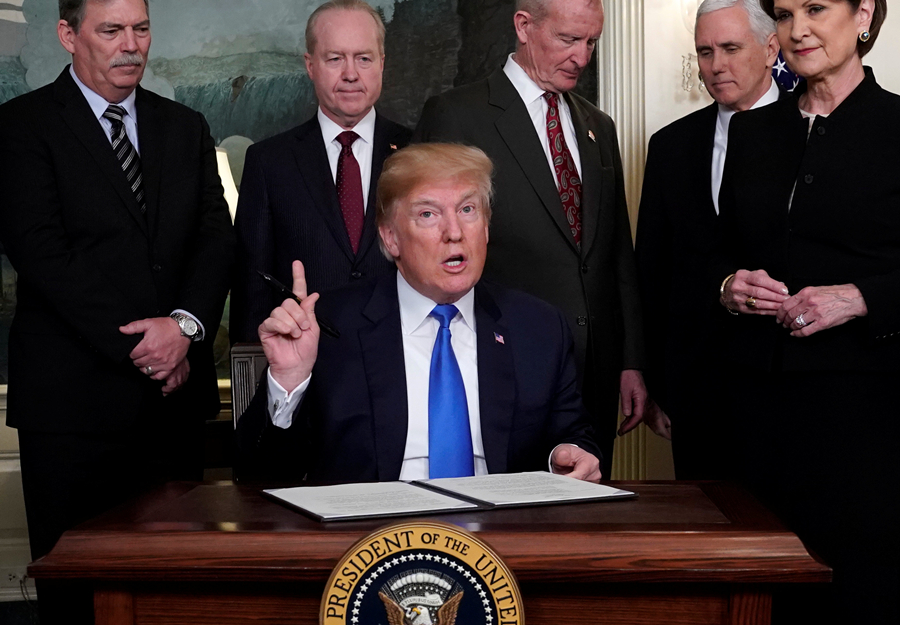China 'firmly opposes' latest US tariff action


China is well prepared and will fight back immediately once the United States takes action based on its trade investigation into the country, the Ministry of Commerce warned on Friday as the world's two largest economies stood on the brink of a trade war.
The ministry's comments came after US President Donald Trump signed a memorandum on Thursday that could impose tariffs on up to $60 billion in imports from China and restrict Chinese investment in the United States.
The memorandum is based on an investigation, launched by the Trump administration in August, under Section 301 of the Trade Act of 1974 into alleged Chinese intellectual property and technology transfer practices.
"China firmly opposes it. It is a typical unilateral and protectionist practice," said Chen Fuli, director-general of the ministry's Department of Treaty and Law.
Chen reiterated China's stance of not wanting or fearing any trade wars and said the country has confidence and capability in dealing with any challenges.
"We have unimpeded communication channels with the US. But we will not negotiate under the precondition of the unilateral Section 301 investigation," said Chen.
Edward Alden, a senior fellow at the Council on Foreign Relations, an independent think tank, said the strategy is that Trump wants to be seen as the driver in terms of negotiations. He described the approach as basically a "shock" strategy.
"The US will see what it can extract from other countries in exchange for removing the threat. China and the US are still in the trade skirmish stage. This action is rolled out (without preparation), and it actually takes time to work through the process so that it can be done," said Alden.
Trade between China and the US, the world's two largest economies, amounted to $580 billion last year. Two-way investment has reached more than $230 billion so far, according to data from the Ministry of Commerce.
Wei Jianguo, former vice-minister of commerce, said it should be noted that among all trading partners of the US, its exports to China are witnessing the fastest expansion.
"The growth rate of US exports to China now stands at about 15 percent, while US export growth to other countries is only 6.7 percent," Wei said.
The US would suffer the bigger loss if it initiates a trade war with China, one of the world's largest consumer markets, Wei said, adding that China has never pursued a trade surplus and has been making efforts to import more from the US.
Meanwhile, China also unveiled plans on Friday to impose tariffs on up to $3 billion in US imports to make up for losses caused by US tariffs that took effect on Friday on Chinese steel and aluminum products.
The list contains 128 products, and China may impose an additional 15 percent tariff on US fruit, nuts, wine and steel pipes, and an extra 25 percent duty on pork and recycled aluminum products.
Chen, of the ministry's Department of Treaty and Law, said China, for the time being, has no intention to charge more tariffs on such US products as soybeans, Boeing aircraft or electronic devices made by Apple.
Fabio Schvartsman, CEO of Brazilian mining company Vale SA, said: "My concern is the effect that these measures and countermeasures will end up having on international trade. It is important for the development of all nations, not only China, (and) certainly for Brazil as well. Being a Brazilian, I'm very concerned that these aggressive approaches the US is taking are increasing protection of its own industry."
Oswald Chan in Hong Kong and Zheng Xin in Beijing contributed to this story.
Contact the writers at [email protected]
































